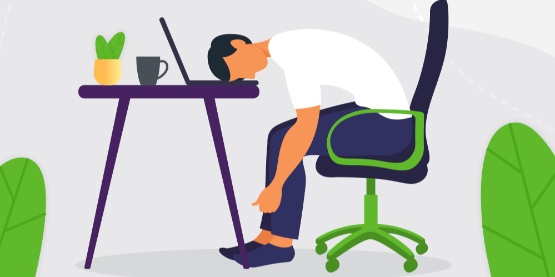
If you are feeling tired, there may be several different explanations for your fatigue. Sometimes this fatigue can occur, especially during busy periods when you work too hard and get little rest. In other cases, other factors may come into play. Either way, it's important to get to the bottom of your post-work fatigue to protect both your physical and mental health.
Signs You're Very Tired After Work
• Having trouble controlling your emotions at the end of the day
• Having trouble focusing your vision
• Having trouble focusing in the afternoon and evening
• Difficulty making even the simplest decisions
• Taking impulsive actions without thinking
• Feelings of forgetfulness
• Feeling hungry all the time
• Having physical symptoms such as stomach upset, dry skin or getting sick often
• Feeling exhausted and stressed without knowing why
• Difficulty falling asleep or staying asleep at night
Many factors can affect your energy levels throughout the day, including the amount and quality of rest you get each night, your overall health, and the nature of your job. If you find it difficult to stay energized at the end of the workday, consider whether some of the factors below are depleting your vitality.
Be late
Your afternoon and evening fatigue may be the result of staying up too late the night before. In some cases, people stay up late during the workday as a way of free time because they don't have time for it; this is a phenomenon known as revenge procrastination.
Depression or Anxiety
Depression can create difficulties with sleep and energy levels. If you're depressed, you may struggle to fall asleep or sleep each night, which can contribute to daytime sleepiness issues. Fatigue and loss of energy are often symptoms of depression, just as a decrease in interest or pleasure in activities you enjoy after work. Feeling anxious can also affect sleep, and research has shown that insufficient sleep can contribute to increased anxiety. Additionally, experiencing excessive anxiety throughout the day can exhaust you and make you feel tired or exhausted.
Continuous Socialization
Being socially engaged all day can be tiring, especially if you tend to be more introverted Extroverts feel energized by social interaction, while introverts burn out quickly
Workplace Stress
Stress at work can wear you out throughout the day and leave you feeling too tired to get up after work and do much more than scroll through your phone or watch TV. Over time, this stress can take a toll on your physical and mental health.
Poor Personal Care
When you don't take care of yourself physically and mentally, you are more likely to feel exhausted at the end of the day. While it's hard to do this when you're feeling tired, doing things like regular exercise and eating healthy foods can help boost your energy levels.
Lack of a Break
Focusing too much on work-related tasks can quickly drain your energy. If you don't take breaks or use them wisely, you may find yourself struggling with feelings of exhaustion after work.
Too Much Caffeine and Sugar
When you're tired, it can be tempting to turn to caffeinated or high-sugar snacks to help you get through the day. Unfortunately, this can often backfire and make you feel even more exhausted after the effects wear off.
How to Deal with Fatigue After Work
Setting Boundaries
If you tend to worry about work even when you're at home, look for ways to create boundaries between your work and home life. Remind yourself that it will still be there tomorrow. Studies have found that mental disengagement from work can increase life satisfaction and reduce psychological tension without harming job performance.
Creating a Daily Ritual
An after-work ritual can be a great way to unwind and create a boundary between your work and the rest of the day. Ensuring that your home is a pleasant and peaceful environment can also be an important way to reduce the stress that can make you feel tired.
Awareness Practice
Mindfulness is a practice that involves focusing entirely on the present moment without judgment. It can be a helpful way to let go of feelings of stress and become more aware of how you're feeling in the moment.
When to Get Help
If you're still struggling with fatigue after work despite making lifestyle changes, then it's time to speak to a professional. Discuss your symptoms with your doctor. In addition to talking about lifestyle factors that can affect your energy level, your doctor will also do a physical exam and lab tests to rule out medical conditions that may be stressing you out.
Some conditions that can lead to fatigue symptoms include:
• Insomnia
• Sleep apnea
• Some drugs
• Diseases or infections (eg HIV, cancer)
• Chronic fatigue syndrome
• Some vitamin deficiencies
• Anemia
• Depression
• Anxiety
If your doctor believes your fatigue may be due to a mental health condition, they may recommend treatments that can help or refer you to a mental health professional. It is common to feel tired after work, but it can sometimes be extreme and affect your health. Being aware of some of the reasons why you might be so tired after work can help you look for ways to combat these feelings of exhaustion. Taking care of yourself, setting boundaries between work and home, and finding ways to deal with stress are important first steps.
